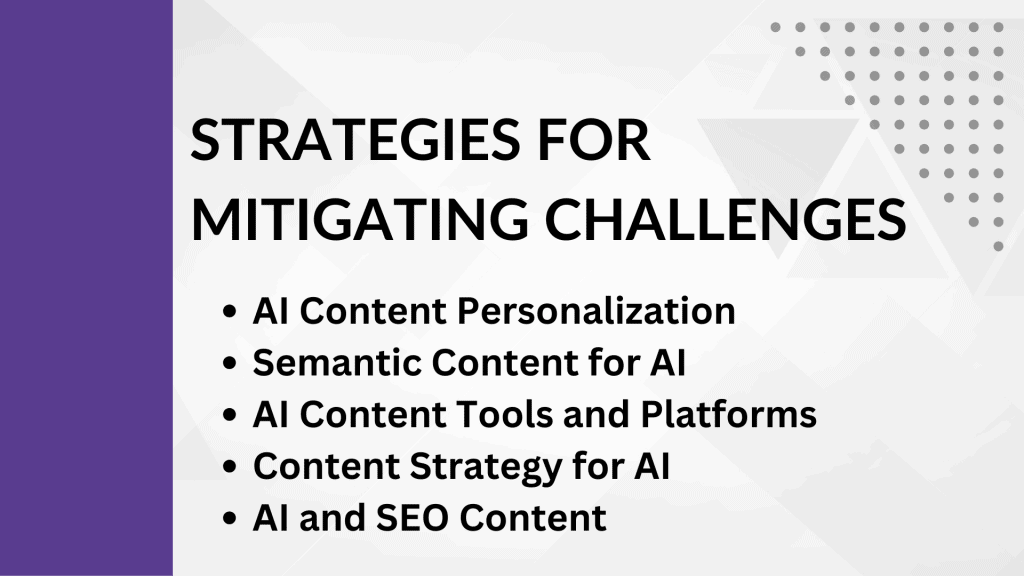The rise of AI in content creation underscores a pivotal shift towards automation and personalization in the digital realm. Crafting content for AI-generated content is not merely about feeding algorithms; it’s about leveraging machine learning and natural language processing to enhance engagement, distribution, and readability. This approach demands a nuanced understanding of AI, content strategies, and optimization techniques to meet Google’s E-A-T guidelines, ensuring credibility, authority, and trustworthiness.
Incorporating AI-driven content optimization into your marketing strategy facilitates scalable, dynamic content curation, tailored to diverse audience metrics. Utilizing AI content platforms and tools, content creators can automate the generation of AI-friendly content strategies, optimizing for AI algorithms while maintaining a human touch. This involves a delicate balance of engaging AI with dynamic content, semantic content for AI, and ensuring content readability for AI, to enhance user engagement and distribution channels. Collaborating with AI for content creation involves leveraging its data processing and pattern recognition capabilities to generate, enhance, or personalize content efficiently and effectively.
Best practices in AI-generated content recommend a focus on personalization and AI content personalization, leveraging AI content analysis to tailor content to individual preferences and behaviours. This approach not only improves engagement but also drives content marketing strategies forward, adapting to evolving AI content trends and guidelines for maximized impact.
Understanding AI in Content Generation
In the realm of digital content creation, the advent of AI has revolutionized how content is generated, tailored, and distributed. Central to this transformation is the concept of “Content for AI-generated content,” a principle that underscores the importance of quality input in achieving quality output in AI-driven content ecosystems.
AI models like GPT (Generative Pre-trained Transformer) and BERT (Bidirectional Encoder Representations from Transformers) stand at the forefront of content creation. These models leverage advanced machine learning and natural language processing algorithms to produce content that is not only relevant but also engaging and readable. GPT, with its ability to generate coherent and contextually relevant text, and BERT’s prowess in understanding the nuances of language, exemplify the strides AI has made in content generation.
The quality of input content plays a pivotal role in shaping the output. High-quality, well-researched, and accurately structured input data enables AI models to generate content that is informative, engaging, and aligned with user intent. This interplay between input quality and output excellence underscores the importance of optimization strategies in content curation and creation.
The Essentials of Crafting Content for AI
In the rapidly evolving digital landscape, crafting content for AI-generated content is not just about writing; it’s about understanding the intricate dance between technology and human readability. As AI, machine learning, and natural language processing continue to shape the future of content creation, the need for clarity, structure, and context has never been more paramount. This content delves into the essentials of creating AI-friendly content, ensuring it resonates with both algorithms and human audiences.
Clarity and Context in AI Content Creation
When developing content for AI, the emphasis on clarity cannot be overstated. AI systems, powered by machine learning and natural language processing, thrive on clear, unambiguous content. This clarity aids in AI content curation and personalization, ensuring that the generated content is relevant and engaging. By incorporating AI content best practices, such as straightforward language and direct answers to user queries, content creators can enhance AI’s understanding and delivery of content.
Structuring Content for AI Optimization
The structure plays a critical role in making content accessible for AI algorithms. Organizing content with clear headings, bullet points, and short paragraphs improves readability for both AI and human readers. This structured approach aids in AI content analysis, allowing algorithms to easily extract key points and themes. Furthermore, leveraging AI content tools to analyze and optimize the structure can lead to more effective content distribution and engagement.
Incorporating SEO and NLP Strategies
SEO strategies for AI-generated content must align with the latest in machine learning in content generation. By integrating NLP and LSI keywords such as AI content personalization and content strategy for AI, creators can ensure their content is optimized for AI and SEO content algorithms. This includes using long-tail keywords like how to optimize content for AI algorithms and AI content generation tools for marketers, which can significantly enhance content discoverability and relevance.
Utilizing AI for Content Personalization and Engagement
AI’s ability to personalize content has revolutionized content marketing. AI-driven content optimization enables the creation of dynamic content that adapts to user preferences and behaviours. By engaging AI with content, marketers can create more targeted and engaging content strategies, leading to higher engagement rates and a more personalized user experience.
Metrics and Scalability in AI-Generated Content
Monitoring AI content metrics is crucial for understanding engagement and optimizing future content. AI content platforms provide valuable insights into content performance, allowing for data-driven decisions in content curation and marketing strategies. Additionally, the scalability of AI-generated content opens up new avenues for content automation, making it possible to produce high-quality content at scale.
Strategies for Optimizing Content for AI Collaboration
In today’s digital age, optimizing content for AI collaboration has become paramount for content creators and marketers. With the evolution of AI, content, machine learning, and natural language processing, the ways we optimize, distribute, and engage with content are transforming. Techniques for making content more understandable and usable by AI include the strategic use of keywords, structured data, and aligning content with AI capabilities to enhance creativity and efficiency.
Content for AI-generated content must be crafted with precision, incorporating AI, machine learning, and natural language processing principles to ensure it is easily interpretable by AI systems. This involves a careful selection of keywords and structured data that AI algorithms can readily process. For instance, incorporating structured data such as schema markup helps AI understand the context of the content, thereby improving its ability to generate relevant and personalized content for users.
Optimization strategies must not only focus on AI’s understanding but also on scalability, personalization, and automation. By leveraging AI content creation tools, marketers can automate content curation, ensuring a steady stream of tailored content that resonates with their audience. This approach not only saves time but also enhances content personalization, a key factor in improving engagement and distribution metrics.
AI-driven content optimization relies heavily on machine learning algorithms to analyze content performance metrics and user engagement. By understanding what content performs well, AI can help in optimizing future content strategies, ensuring that the content is not only SEO-friendly but also engaging and valuable to the reader.
Content readability is another critical aspect when creating Content for AI-generated content. AI tools, powered by natural language processing, can analyze the readability of content, suggesting improvements to make it more accessible to a wider audience. This is crucial for ensuring that the content quickly answers the searcher’s intent and provides immediate value.
Incorporating AI content analysis tools can further enhance content strategies. These tools can provide insights into content trends, audience preferences, and engagement patterns, enabling content creators to craft strategies that align with AI’s capabilities and the evolving content landscape.
For marketers looking to optimize their content for AI, considering AI content generation tools is essential. These tools can help in creating dynamic content that engages AI, ensuring that the content remains relevant and effective in an ever-changing digital environment.
Challenges in AI Content Collaboration
Creating content for AI-generated content presents unique challenges that require a nuanced understanding of AI, content creation, and the interplay between the two. As we dive into the intricacies of producing Content for AI-generated content, it’s essential to address common pitfalls such as managing biases, ensuring factual accuracy, and maintaining reader engagement. These hurdles are not insurmountable but necessitate a strategic approach grounded in the latest SEO and content marketing principles.
Managing Biases in AI Content Creation
Bias in AI content creation can skew perspectives and perpetuate stereotypes, leading to content that may not be universally relatable or accurate. To mitigate biases, it’s crucial to use diverse data sets in machine learning models and regularly audit content for unintended biases. Employing AI content analysis tools can help identify and correct these biases, ensuring content remains fair and inclusive.
Ensuring Factual Accuracy
AI-generated content, driven by algorithms and natural language processing, can sometimes miss the mark on factual accuracy. To combat this, integrating robust fact-checking protocols and sourcing information from credible, authoritative sources is essential. AI content platforms should be programmed to prioritize content curation from reputable outlets, enhancing the E-A-T (Expertise, Authoritativeness, Trustworthiness) quality of the content.
Engagement and Readability
Maintaining engagement and readability in AI-generated content is pivotal. Utilizing natural language processing to analyze and adapt the content’s tone, style, and complexity to match the target audience’s preferences can significantly boost readability and engagement. AI-driven content optimization tools can analyze engagement metrics and reader feedback to continually refine content presentation and delivery.

Strategies for Mitigating Challenges
To address these challenges effectively, several strategies can be employed:
- AI Content Personalization: Leveraging machine learning in content generation to tailor content to individual preferences, enhancing relevance and engagement.
- Semantic Content for AI: Incorporating semantic structuring in content helps AI understand the context and deliver more accurate, contextually relevant content.
- AI Content Tools and Platforms: Utilizing advanced AI content tools for content writers can streamline the creation process, ensuring consistency in tone, style, and factual accuracy.
- Content Strategy for AI: Developing a comprehensive content strategy that includes AI content best practices, such as regular updates to AI models with new information, can significantly improve content quality.
- AI and SEO Content: Integrating SEO strategies for AI-generated content ensures that content not only appeals to human readers but also ranks well in search engines, increasing visibility and reach.
Ethical Considerations in AI-Generated Content
In the realm of digital content, the advent of AI-generated content has opened new frontiers in efficiency and scalability, yet it brings forth significant ethical considerations. The integration of machine learning and natural language processing in content creation has revolutionized the way we conceive, produce, and disseminate information. However, it’s imperative to navigate this landscape with a keen sense of responsibility towards creativity, originality, and ethical compliance.
AI, with its prowess in optimization and algorithms, offers unparalleled advantages in marketing and personalization. Content AI-generated content must not only resonate with human readers but also align with SEO best practices. The use of AI in content generation demands a delicate balance between automation and human touch, ensuring that the content remains engaging, readable, and valuable.
Content strategy for AI involves leveraging machine learning in content generation to enhance the personalization and curation of content. This approach not only improves engagement but also optimizes distribution channels, making content more accessible to diverse audiences. AI-driven content optimization utilizes semantic analysis to enrich the content’s relevance and readability, thereby enhancing the user experience.
The role of AI in content marketing is increasingly significant, with AI content platforms and tools offering new opportunities for content curation and automation. These technologies enable marketers to scale their content production without compromising the quality, thus meeting the growing demand for tailored content. AI content analysis and AI content metrics provide insights into user engagement and content performance, guiding content creators in refining their strategies.
Creating AI-friendly content strategies involves understanding the nuances of machine learning in content generation and natural language processing. This includes optimizing content for AI algorithms to ensure that the content is not only discoverable but also resonates with the intended audience. Engaging AI with dynamic content requires a blend of creativity and technical acumen, ensuring that the content remains fresh, relevant, and engaging.
AI content generation tools for marketers are evolving, offering sophisticated solutions for content automation and personalization. These tools, powered by AI and machine learning, enable content creators to produce high-quality content at scale, tailored to the preferences and behaviors of their audience. The integration of AI in content strategies enhances the efficiency and effectiveness of content marketing campaigns, driving better outcomes in terms of engagement and conversion.
Conclusion
The collaboration between humans and AI in content creation is redefining the landscape of digital marketing and online information dissemination. Content for AI-generated content, when optimized effectively, leverages machine learning and natural language processing to enhance personalization, curation, and scalability. This synergy not only improves engagement metrics but also ensures the distribution of high-quality, readable content that resonates with the intended audience.
Incorporating AI in content strategy enables the automation of routine tasks, allowing content creators to focus on innovation and creativity. By utilizing AI content generation tools for marketers, professionals can create AI-friendly content strategies that are aligned with SEO strategies for AI-generated content. This includes optimizing content tone for AI interpretation and improving content readability for AI, which are crucial for enhancing user experience and engagement.
Moreover, AI-driven content optimization employs algorithms to analyze content performance, providing insights into how content can be refined to meet the ever-evolving demands of digital marketing. The use of semantic content for AI and AI content personalization tailors the user experience, making content more relevant and engaging.
To stay ahead, content creators must embrace AI content best practices, focusing on creating content that is not only optimized for AI algorithms but also delivers value to the end reader. This involves engaging AI with dynamic content and measuring success in AI-driven content campaigns through robust metrics and analytics.
FAQs
What is AI-generated content?
AI-generated content refers to text, images, videos, or music that is created by artificial intelligence algorithms rather than human creators. These algorithms can analyze vast amounts of data, learn from patterns, and produce new content based on the parameters and prompts given to them.
How does AI impact content creation?
AI impacts content creation by making it faster, more efficient, and often more personalized. It can generate drafts, suggest edits, create variations, and even produce entirely new pieces of content, reducing the time and effort required from human creators and potentially increasing the volume and diversity of content.
Can AI improve content marketing strategies?
Yes, AI can improve content marketing strategies by enabling personalized content creation at scale, optimizing content for search engines, predicting content trends, analyzing performance data more effectively, and automating repetitive tasks, thereby enhancing engagement and conversion rates.
What are the best tools for AI-generated content?
Some of the best tools for AI-generated content include GPT-3 for text, DALL-E for images, AIVA for music composition, and DeepArt for artistic image transformation. These tools use advanced machine learning algorithms to generate high-quality content across various formats.
How to optimize content for AI algorithms?
To optimize content for AI algorithms, focus on using relevant keywords naturally, structuring content with clear headings, ensuring high-quality and originality, making use of meta tags, and keeping the user experience in mind. Regularly updating content and using data-driven insights to guide content creation can also help.
What is natural language processing in AI?
Natural language processing (NLP) in AI is a field that focuses on the interaction between computers and humans using natural language. It involves the development of algorithms that allow computers to understand, interpret, and generate human language in a way that is both meaningful and useful.
How can AI personalize content?
AI can personalize content by analyzing user data, such as past behavior, preferences, and interactions, to tailor content recommendations, adjust content presentation, and create dynamic content that resonates with individual users, thereby enhancing user engagement and satisfaction.
What are the benefits of AI-driven content?
The benefits of AI-driven content include increased efficiency in content production, the ability to generate personalized content at scale, improved content relevance and engagement, enhanced creativity through data-driven insights, and the automation of repetitive tasks, leading to cost savings and more time for strategic work.
How to measure the success of AI content?
Measuring the success of AI content involves analyzing metrics such as engagement rates, conversion rates, user retention, time spent on content, social shares, and feedback. Advanced AI tools can also provide insights into content performance, enabling continuous optimization based on data-driven decisions.
Is AI content considered ethical?
The ethics of AI content is a complex issue that depends on transparency, consent, and the purpose of use. Ethical considerations include ensuring AI-generated content is not misleading or harmful, maintaining clear disclosure when content is AI-generated, and using AI in ways that respect copyright laws and personal privacy.






